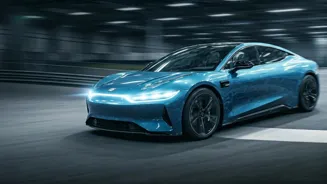Autonomous Driving Technologies
The automotive world has witnessed a surge in autonomous driving technologies. These advancements have become pivotal, impacting businesses across the
sector. The virtualization of these technologies, enabling simulations and virtual testing, has significantly accelerated the development process. This involves sophisticated software algorithms and hardware components that enable vehicles to perceive their surroundings and make informed decisions, further enhancing safety and efficiency. As these technologies mature, they are reshaping the roles of manufacturers, suppliers, and software developers, and are also influencing the consumer experience, promising greater convenience and potentially reduced accidents through improved vehicle intelligence. This shift necessitates constant adaptation and investment by all the industry players to stay competitive.
Electrification and Environment
The automotive industry's movement towards electrification is primarily driven by concerns about environmental sustainability and the need to reduce carbon emissions. Electric vehicles (EVs) are gaining traction as a promising alternative to traditional combustion engine vehicles, contributing to cleaner air and reduced dependence on fossil fuels. This shift presents challenges and opportunities for businesses, including investments in new manufacturing facilities, supply chain adjustments for batteries and electric components, and the development of charging infrastructure. Furthermore, governments worldwide are implementing regulations and incentives to promote EV adoption, thus accelerating the transition. Consumer preferences are also changing, with growing demand for EVs that offer greater range, faster charging, and improved performance, encouraging innovation in battery technology and vehicle design.
Urban Transport Innovation
Radical changes are occurring in urban transport, spurred by concepts like 'Mobilicity', which are reshaping how people and goods move within cities. The focus is shifting towards sustainable, efficient, and connected transportation systems, encompassing diverse approaches like shared mobility services, autonomous shuttles, and smart traffic management solutions. This transformation impacts urban infrastructure, requiring investments in new transit options, smart city technologies, and strategies for managing traffic congestion. Businesses are playing a crucial role, investing in developing and deploying these innovative solutions. The goal is to create user-friendly transportation systems that improve air quality, reduce travel times, and enhance overall urban living conditions, aligning with sustainability goals and increasing urban mobility.
Consumer Trust and Connectivity
The expanding use of data and connectivity in modern vehicles is crucial for gaining consumer trust and ensuring the safety of new car models. Connected cars gather large amounts of data from various sources, allowing real-time monitoring of vehicle performance, and providing potential accident prevention. The ability to continuously update software and implement safety features enhances reliability. However, security and privacy are major concerns as these advancements require secure data management and protection. Car manufacturers and tech companies must prioritize data security and transparency to build consumer confidence. This includes clear data usage policies and robust cybersecurity measures to prevent unauthorized access and data breaches, which ensure trust in the reliability of connected car systems.
Safety Assessment Expansion
Euro NCAP's testing criteria are continually expanding to reflect the evolving landscape of automotive safety. The assessments now include a broader range of scenarios and technologies, such as assessing the performance of advanced driver-assistance systems (ADAS), which aim to prevent or mitigate collisions. Furthermore, the organization evaluates pedestrian and cyclist protection, requiring manufacturers to ensure vehicles can detect and respond to vulnerable road users. Testing also focuses on the protection offered to vehicle occupants in the event of a collision. Euro NCAP's rigorous and extensive testing programs have enhanced the safety standards of cars worldwide, encouraging manufacturers to invest in better safety features and technologies.
The Drift to Safety
The automotive industry is moving toward higher safety levels, driven by consumer demand, regulatory requirements, and technological advances. Automakers are investing in better safety features and technologies, aiming to minimize accidents and protect occupants. The trend encompasses advanced driver-assistance systems, improved structural designs, and enhanced crash test performance. Government regulations are playing a crucial role, setting higher safety standards and encouraging manufacturers to adopt the best practices. Additionally, consumer awareness and preference for safer vehicles drive this shift, influencing purchasing decisions and pushing the industry toward improved safety. This continuous quest for better safety standards benefits all road users and contributes to an overall reduction in traffic-related fatalities and injuries.
B2B in Automotive
The transformation of the automotive industry has major implications for B2B players, including component suppliers, technology providers, and service companies. They need to adjust their strategies to meet the evolving demands of automakers and consumers. This involves adapting to new technologies like autonomous driving and electrification, investing in research and development, and building strategic partnerships. Data and connectivity have become key aspects. Cybersecurity, data privacy, and ensuring the reliability and safety of automotive systems are more important than ever, requiring B2B players to offer secure, high-performing solutions. These companies play a crucial role in driving innovation, supporting the industry's goals for sustainable development, and contributing to the overall improvement of vehicle safety and performance.



















